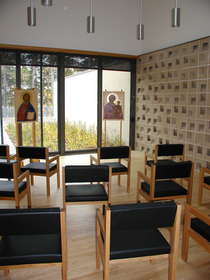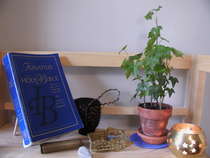 PHOTO: Mary van Balen I slipped into the pew a little late and noticed the lovely palm branches. Some people held them in their hands, some had laid them on the seat behind them. A few secured them with the hat clips on the pew backs, relics of days when hats were ordinary attire for men. They were not the long slender palm buds that my father had woven into crosses or interesting cone shapes when I was a child. These were the dark green leaves of the Emerald Palm and this was first time I had seen them.
PHOTO: Mary van Balen I slipped into the pew a little late and noticed the lovely palm branches. Some people held them in their hands, some had laid them on the seat behind them. A few secured them with the hat clips on the pew backs, relics of days when hats were ordinary attire for men. They were not the long slender palm buds that my father had woven into crosses or interesting cone shapes when I was a child. These were the dark green leaves of the Emerald Palm and this was first time I had seen them.
As the familiar passion story was proclaimed, my mind wandered. When the story told of Jesus standing before the high priest, I thought of people today, standing in a court room, perhaps with families and supporters attending; perhaps the accused were alone. What dread fills their hearts? Remorse for the guilty ones? Anger for those wrongly accused? What fear for those who love them?
I thought of the emotions of those gathered in support of Travon Martin’s parents in Miami. Thousands gathered. I wondered about the family and friends of George Zimmerman in the face of a growing movement and escalating tensions across the country. I thought of all those in our prison system. I thought of the obscurity of most of their cases. And I thought of Jesus.
Who could have imagined, in his day, that this drama played out in a garden, a courtyard, a place of execution, would become what I imagine is the most told story in human history? A first century preacher, betrayed by friends, given over to authorities motivated in part by fear, ambition, and ignorance is an unlikely hero.
I listened as the story continued. I thought of those fighting other battles, suffering other indignities and injustices. “Everyone struggles with something that can strangle the spirit if not the body. Most of them I will never know. Most stories do not extend beyond family and intimates.”
So, what comfort the passion story? Jesus has walked in our shoes or sandals. His bare feet were cut and bruised by life and death. God knows our plight. God shared it then. God shares it now. The comfort? We have a companion on our journey who understands how pain and suffering transform as much as love and joy. Perhaps more. We haver a companion who has walked the path and knows it ends, not it death, but in life. When we see only darkness, our Companion reminds of that light will come. Has come. Sometimes, Jesus even lends us his eyes to see. What counts is the journey and what happens to us along the way.
I slip out of the pew early to drive to work as so many do, even on this holy day. On my way out of church, I take a palm leaf from the basket by the main aisle. I will be busy today with people walking their journeys. My prayer is to reflect our Companion’s hope and compassion. To be green with life, like the palm in my hand.
 PHOTO: Mary van Balen “This morning the green fists of the peonies are getting ready/to break my heart/ as the sun rises,/ as the sun strokes them with his old, buttery fingers/ and they open— / pools of lace,/white and pink…”
PHOTO: Mary van Balen “This morning the green fists of the peonies are getting ready/to break my heart/ as the sun rises,/ as the sun strokes them with his old, buttery fingers/ and they open— / pools of lace,/white and pink…” London School of Economics crest Yesterday I walked a couple of blocks to the local parish’s Lenten fish fry. My sister had recommended it saying the fish was good and the people friendly. My refrigerator was empty and enjoying at least one Lenten fish fry sounded like a good idea.
London School of Economics crest Yesterday I walked a couple of blocks to the local parish’s Lenten fish fry. My sister had recommended it saying the fish was good and the people friendly. My refrigerator was empty and enjoying at least one Lenten fish fry sounded like a good idea. PHOTO: Syria Under Government Crackdown, Elizabeth Arrott public domain Seek the Lord while he is still to be found, call to him while he is still near. Let the wicked man abandon his way, the evil man his thoughts. Let him turn back to the Lord who will take pity on him, to our God who is rich in forgiving.
PHOTO: Syria Under Government Crackdown, Elizabeth Arrott public domain Seek the Lord while he is still to be found, call to him while he is still near. Let the wicked man abandon his way, the evil man his thoughts. Let him turn back to the Lord who will take pity on him, to our God who is rich in forgiving.
 PHOTO: Elizabeth van Balen Delphia – Bean Creek Funny how a piece of mail that arrived late could be just on time. Two weeks after the beginning of Lent, a one-page reflection on a program for the season appeared in my mailbox. Sent from the Benedictine Abbey in North Dakota,
PHOTO: Elizabeth van Balen Delphia – Bean Creek Funny how a piece of mail that arrived late could be just on time. Two weeks after the beginning of Lent, a one-page reflection on a program for the season appeared in my mailbox. Sent from the Benedictine Abbey in North Dakota, 
 PHOTO: Mary van Balen (Originally published in the Catholic Times, March 11, 2012 © 2012 Mary van Balen)
PHOTO: Mary van Balen (Originally published in the Catholic Times, March 11, 2012 © 2012 Mary van Balen) Lent is a time that reminds us to consider our goal. Whatever discipline or practices we are using to observe this season are meant to help us focus on what is most important in our lives: our relationship with the Holy One. That is not something apart from the rest of our lives, but rather integral to everything we do. How we interact with people at our workplace, what we do to recreate body and spirit, how we respond to needs of others, how we live with our families and friends.
Lent is a time that reminds us to consider our goal. Whatever discipline or practices we are using to observe this season are meant to help us focus on what is most important in our lives: our relationship with the Holy One. That is not something apart from the rest of our lives, but rather integral to everything we do. How we interact with people at our workplace, what we do to recreate body and spirit, how we respond to needs of others, how we live with our families and friends. The Wisdom we seek dwells within, a gift of the Incarnation. These weeks are good times to reflect on using Scripture and other writing that feeds our spirits. It is a time to reflect on how our relationship with God influences our interaction with the world.
The Wisdom we seek dwells within, a gift of the Incarnation. These weeks are good times to reflect on using Scripture and other writing that feeds our spirits. It is a time to reflect on how our relationship with God influences our interaction with the world.  Click “Works” tab to view my book Today is the feast of Saint Katharine Drexel, daughter of one of the wealthiest families in the United States in her lifetime. She was born in 1858 into the wealthy banking family, one of three daughters. When her father died, she, along with her sisters, inherited 90% of his fortune (He had tithed the rest to charitable organizations.)
Click “Works” tab to view my book Today is the feast of Saint Katharine Drexel, daughter of one of the wealthiest families in the United States in her lifetime. She was born in 1858 into the wealthy banking family, one of three daughters. When her father died, she, along with her sisters, inherited 90% of his fortune (He had tithed the rest to charitable organizations.)  PHOTO: Mary van Balen I didn’t know the aftermath of divorce would be so difficult, just like I didn’t know my marriage would be untenable. It isn’t what I miss. Surely the good that came of the marriage took root and lives. And of course there are my grown children. No, it is not the missing. It is the acceptance of who I am and where I am that is the struggle.
PHOTO: Mary van Balen I didn’t know the aftermath of divorce would be so difficult, just like I didn’t know my marriage would be untenable. It isn’t what I miss. Surely the good that came of the marriage took root and lives. And of course there are my grown children. No, it is not the missing. It is the acceptance of who I am and where I am that is the struggle.